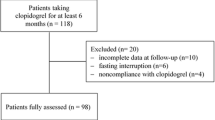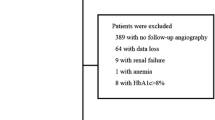Abstract
Although patients with impaired glucose tolerance (IGT) are at increased atherothrombotic risk, it is unclear how antiplatelet drugs act in patients with IGT. The aim of this study was to investigate the pharmacodynamic response to clopidogrel in patients with IGT and insulin resistance (IR). A 75 g oral glucose tolerance test was performed in 65 coronary artery disease (CAD) patients on aspirin and clopidogrel therapy. Platelet function tests were assessed at 3 time-points by light transmittance aggregometry using ADP (5 and 20 μmol/L) stimuli. 30 patients had IGT and 35 normal glucose tolerance (NGT). Among them, 13 patients showed IR. Following ADP stimuli, patients with IGT showed significantly higher maximal platelet aggregation at each time point than those with NGT patients. This resulted in greater high on-treatment platelet reactivity (HPR) rates at each time point in IGT patients (53.3–36.7 vs. 14.3–11.4 %, p < 0.05). A multivariable logistic regression analysis showed that IGT status was the strongest predictor of HPR (odds ratio 7.54, 95 % CI 1.95–29.1, p = 0.003). Following a glucose load, profiles of platelet reactivity varied according to IR status, with minimal changes over time in patients with IR, while there was a significant reduction in the non-IR patients. In aspirin and clopidogrel-treated patients with CAD, IGT is associated with enhanced platelet reactivity and increased rates of HPR compared with NGT patients. These findings suggest the presence of platelet dysfunction in patients with IGT, which may be attributed to the presence of IR.



Similar content being viewed by others
References
International Diabetes Federation. IDF diabetes atlas. Epidemiology and mobidity. In: International Diabetes Federation. http://www.idf.org/. Accessed 10 Feb 2014
Tominaga M, Eguchi H, Manaka H, Igarashi K, Kato T, Sekikawa A (1999) Impaired glucose tolerance is a risk factor for cardiovascular disease, but not impaired fasting glucose. The Funagata Diabetes Study. Diabetes Care 22:920–924
DECODE Study Group, The European Diabetes Epidemiology Group (2001) Glucose tolerance and cardiovascular mortality: comparison of fasting and 2-hour diagnostic criteria. Arch Intern Med 161:397–405
Pankow JS, Kwan DK, Duncan BB, Schmidt MI, Couper DJ, Golden S et al (2007) Cardiometabolic risk in impaired fasting glucose and impaired glucose tolerance: the Atherosclerosis Risk in Communities Study. Diabetes Care 30:325–331
Qiao Q, Pyörälä K, Pyörälä M, Nissinen A, Lindström J, Tilvis R et al (2002) Two-hour glucose is a better risk predictor for incident coronary heart disease and cardiovascular mortality than fasting glucose. Eur Heart J 23:1267–1275
Meigs JB, Nathan DM, D’Agostino RB Sr, Wilson PW, Framingham Offspring Study (2002) Fasting and postchallenge glycemia and cardiovascular disease risk: the Framingham Offspring Study. Diabetes Care 25:1845–1850
Angiolillo DJ, Fernandez-Ortiz A, Bernardo E, Alfonso F, Macaya C, Bass TA et al (2007) Variability in individual responsiveness to clopidogrel: clinical implications, management and future perspectives. J Am Coll Cardiol 49:1505–1516
Ferreiro JL, Angiolillo DJ (2009) Clopidogrel response variability: current status and future directions. Thromb Haemost 102:7–14
Bonello L, Tantry US, Marcucci R, Blindt R, Angiolillo DJ, Becker R et al (2010) Consensus and future directions on the definition of high on-treatment platelet reactivity to adenosine diphosphate. J Am Coll Cardiol 56:919–933
Angiolillo DJ, Bernardo E, Zanoni M, Vivas D, Capranzano P, Malerba G et al (2011) Impact of insulin receptor substrate-1 genotypes on platelet reactivity and cardiovascular outcomes in patients with type 2 diabetes mellitus and coronary artery disease. J Am Coll Cardiol 58:30–39
Angiolillo DJ, Bernardo E, Sabaté M, Jimenez-Quevedo P, Costa MA, Palazuelos J et al (2007) Impact of platelet reactivity on cardiovascular outcomes in patients with type 2 diabetes mellitus and coronary artery disease. J Am Coll Cardiol 50:1541–1547
Franchi F, Angiolillo DJ (2015) Novel antiplatelet agents in acute coronary syndrome. Nat Rev Cardiol 12:30–47
Ferreiro JL, Angiolillo DJ (2011) Diabetes and antiplatelet therapy in acute coronary syndrome. Circulation 123:798–813
Ferroni P, Basili S, Falco A, Davì G (2004) Platelet activation in type 2 diabetes mellitus. J Thromb Haemost 2:1282–1291
Angiolillo DJ, Fernandez-Ortiz A, Bernardo E, Ramírez C, Sabaté M, Jimenez-Quevedo P et al (2005) Platelet function profiles in patients with type 2 diabetes and coronary artery disease on combined aspirin and clopidogrel treatment. Diabetes 54:2430–2435
Angiolillo DJ, Bernardo E, Ramirez C, Costa MA, Sabaté M, Jimenez-Quevedo P et al (2006) Insulin therapy is associated with platelet dysfunction in patients with type 2 diabetes mellitus on dual oral antiplatelet treatment. J Am Coll Cardiol 48:298–304
Angiolillo DJ, Shoemaker SB, Desai B, Yuan H, Charlton RK, Bernardo E et al (2007) A randomized comparison of a high clopidogrel maintenance dose in patients with diabetes mellitus and coronary artery disease: results of the Optimizing Antiplatelet Therapy in Diabetes Mellitus (OPTIMUS) Study. Circulation 115:708–716
van Werkum JW, Topcu Y, Postma S, Kelder JC, Hackeng CM, ten Berg JM et al (2008) Effects of diabetes mellitus on platelet reactivity after dual antiplatelet therapy with aspirin and clopidogrel. Thromb Haemost 99:637–639
Serebruany V, Pokov I, Kuliczkowski W, Chesebro J, Badimon J (2008) Baseline platelet activity and response after clopidogrel in 257 diabetics among 822 patients with coronary artery disease. Thromb Haemost 100:76–82
Angiolillo DJ, Badimon JJ, Saucedo JF, Frelinger AL, Michelson AD, Jakubowski JA (2011) A pharmacodynamic comparison of prasugrel vs. high-dose clopidogrel in patients with type 2 diabetes mellitus and coronary artery disease: results of the Optimizing anti-Platelet Therapy in diabetes MellitUS (OPTIMUS)-3 Trial. Eur Heart J 32:838–846
Angiolillo DJ, Jakubowski JA, Ferreiro JL, Tello-Montoliu A, Rollini F, Franchi F et al (2014) Impaired responsiveness to the platelet P2Y12 receptor antagonist clopidogrel in patients with type 2 diabetes and coronary artery disease. J Am Coll Cardiol 64:1005–1014
Norhammar A, Tenerz A, Nilsson G, Hamsten A, Efendíc S, Rydén L et al (2002) Glucose metabolism in patients with acute myocardial infarction and no previous diagnosis of diabetes mellitus: a prospective study. Lancet 359:2140–2144
Ohmura T, Ueda K, Kiyohara Y, Kato I, Iwamoto H, Nakayama K et al (1993) Prevalence of type 2 (non-insulin-dependent) diabetes mellitus and impaired glucose tolerance in the Japanese general population: the Hisayama Study. Diabetologia 36:1198–1203
Gerstein HC, Miller ME, Goff DC Jr, Byington RP, Bigger JT, Buse JB, Action to Control Cardiovascular Risk in Diabetes Study Group (2008) Effects of intensive glucose lowering in type 2 diabetes. N Engl J Med 358:2545–2559
Lundström A, Laska AC, Von Arbin M, Jörneskog G, Wallén H (2014) Glucose intolerance and insulin resistance as predictors of low platelet response to clopidogrel in patients with minor ischemic stroke or TIA. Platelets 25:102–110
American Diabetes Association (2014) Diagnosis and classification of diabetes mellitus. Diabetes Care 37(Suppl 1):S81–S90
Matthews DR, Hosker JP, Rudenski AS, Naylor BA, Treacher DF, Turner RC (1985) Homeostasis model assessment: insulin resistance and beta-cell function from fasting plasma glucose and insulin concentrations in man. Diabetologia 28:412–419
Massucco P, Mattiello L, Russo I, Traversa M, Doronzo G, Anfossi G et al (2005) High glucose rapidly activates the nitric oxide/cyclic nucleotide pathway in human platelets via an osmotic mechanism. Thromb Haemost 93:517–526
Sudic D, Razmara M, Forslund M, Ji Q, Hjemdahl P, Li N (2006) High glucose levels enhance platelet activation: involvement of multiple mechanisms. Br J Haematol 133:315–322
Spectre G, Östenson CG, Li N, Hjemdahl P (2012) Postprandial platelet activation is related to postprandial plasma insulin rather than glucose in patients with type 2 diabetes. Diabetes 61:2380–2384
Ferreira IA, Eybrechts KL, Mocking AI, Kroner C, Akkerman JW (2004) IRS-1 mediates inhibition of Ca2+ mobilization by insulin via the inhibitory G-protein Gi. J Biol Chem 279:3254–3264
Ferreira IA, Mocking AI, Feijge MA, Gorter G, van Haeften TW, Heemskerk JW et al (2006) Platelet inhibition by insulin is absent in type 2 diabetes mellitus. Arterioscler Thromb Vasc Biol 26:417–422
Sidhu JS, Cowan D, Tooze JA, Kaski JC (2004) Peroxisome proliferator-activated receptor-gamma agonist rosiglitazone reduces platelet activity in patients without diabetes mellitus who have coronary artery disease. Am Heart J 147:e25
Akbiyik F, Ray DM, Gettings KF, Blumberg N, Francis CW, Phipps RP (2004) Human bone marrow megakaryocytic and platelets express PPAR gamma and PPAR gamma agonists blunt platelet release of CD40 ligand and thromboxanes. Blood 104:1361–1368
Li D, Chen K, Sinha N, Zhang X, Wang Y, Sinha AK et al (2005) The effects of PPAR gamma ligand pioglitazone on platelet aggregation and arterial thrombus formation. Cardiovasc Res 65:907–912
Bodary P, Vargas FB, King SAD, Jongeward KL, Wickenheiser KJ, Eitzman DT (2005) Pioglitazone protects against thrombosis in a mouse model of obesity and insulin resistance. J Thromb Haemost 3:2149–2153
Khanolkar MP, Morris RH, Thomas AW, Bolusani H, Roberts AW, Geen J et al (2008) Rosiglitalozone produces a greater reduction in circulating platelet activity compared with glicazide in patients with type 2 diabetes mellitus-an effect probably mediated by direct platelet PPAR gamma activation. Atherosclerosis 197:718–724
Suryadevara S, Ueno M, Tello-Montoliu A, Ferreiro JL, Desai B, Rollini F et al (2012) Effects of pioglitazone on platelet P2Y12-mediated signalling in clopidogrel-treated patients with type 2 diabetes mellitus. Thromb Haemost 108:930–936
Mellbin LG, Malmberg K, Norhammar A, Wedel H, Rydén L, DIGAMI 2 Investigators (2008) The impact of glucose lowering treatment on long-term prognosis in patients with type 2 diabetes and myocardial infarction: a report from the DIGAMI 2 trial. Eur Heart J 29:166–176
Johnson JA, Majumdar SR, Simpson SH, Toth EL (2002) Decreased mortality associated with the use of metformin compared with sulfonylurea monotherapy in type 2 diabetes. Diabetes Care 25:2244–2248
Mega JL, Close SL, Wiviott SD, Shen L, Hockett RD, Brandt JT et al (2009) Cytochrome p-450 polymorphisms and response to clopidogrel. N Engl J Med 360:354–362
Man M, Farmen M, Dumaual C, Teng CH, Moser B, Irie S et al (2010) Genetic variation in metabolizing enzyme and transporter genes: comprehensive assessment in 3 major East Asian subpopulations with comparison to Caucasians and Africans. J Clin Pharmacol 50:929–940
Acknowledgments
The research was supported by a research Grant from Kinki University. We would like to thank José L. Ferreiro for comments on the final draft and Atsuko Murata for technical assistance.
Conflict of interest
Dominick J. Angiolillo: Received payment as an individual for: (a) Consulting fee or honorarium from Bristol Myers Squibb, Sanofi-Aventis, Eli Lilly, Daiichi Sankyo, The Medicines Company, AstraZeneca, Merck, Abbott Vascular and PLx Pharma; (b) Participation in review activities from CeloNova, Johnson & Johnson, St. Jude, and Sunovion. Institutional payments for grants from Bristol Myers Squibb, Sanofi-Aventis, Glaxo Smith Kline, Gilead, Eli Lilly, Daiichi Sankyo, The Medicines Company, and AstraZeneca. Shunichi Miyazaki: research grants from AstraZeneca Co. Ltd, Daiichi-Sankyo Pharmaceutical Co. Ltd, and Shionogi & Co. Ltd. Masafumi Ueno, Kosuke Fujita, Hiroyuki Yamamoto, Tomoyuki Ikeda, Tatsuya Suga, Kenji Yamaji, Shinichiro Ikuta, Kazuhiro Kobuke and Yoshitaka Iwanaga declare that they have no conflict of interest.
Author information
Authors and Affiliations
Corresponding author
Rights and permissions
About this article
Cite this article
Ueno, M., Fujita, K., Yamamoto, H. et al. Impact of impaired glucose tolerance on clopidogrel response in patients with coronary artery disease. J Thromb Thrombolysis 40, 174–181 (2015). https://doi.org/10.1007/s11239-015-1177-7
Published:
Issue Date:
DOI: https://doi.org/10.1007/s11239-015-1177-7




